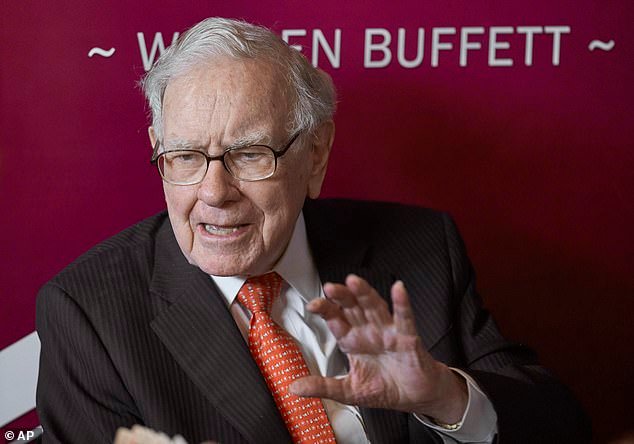Warren Buffett’s Berkshire Hathaway has sold its holdings in funds tracking the S&P 500, in his latest retreat from the stock market.
The conglomerate dissolved its shares in two exchange-traded funds, or ETFs, from major investment companies Vanguard and State Street Global Advisors.
ETFs are a collection of stocks or bonds in a single fund which track an index like the S&P 500, Nasdaq or Dow Jones. The S&P 500 is an index of the 500 largest companies in the US.
Each of Berkshire’s ETF holdings was valued at roughly $22 million, according to the Financial Times, and were liquidated in the fourth quarter of 2024.
It leaves 94-year-old Buffett with no ETF holdings, despite the investor speaking highly of the funds in the past, and encouraging others to buy into them.
In Berkshire’s annual shareholder letter in 2016, Buffett said he recommended ‘low-cost index funds’, and preferred them to hedge funds.
‘When trillions of dollars are managed by Wall Streeters charging high fees, it will usually be the managers who reap outsized profits, not the clients,’ he said at the time.
In the same letter, Buffett also hailed Vanguard founder Jack Bogle as ‘the person who has done the most for American investors.’

Warren Buffett’s Berkshire Hathaway has sold its holdings in funds tracking the S&P 500, in his latest retreat from the stock market
The sale of the ETFs underscores a larger trend at Berkshire which has seen the company sell off stocks and hoard cash.
At the end of last year, the company held its largest cash position on record – at $334.2 billion.
Some investors are concerned that Buffett’s cash holdings indicate that he is retreating from the stock market as he sees it as overvalued – or if he knows something they don’t about an impending crash.
US stocks have faltered in recent weeks, amid concerns around Donald Trump’s tariff plans, sticky inflation and a potentially slowing economy.
Some investors fear the S&P 500 is too reliant on a handful of expensive technology stocks.
In his annual letter released earlier this month, the so-called Oracle of Omaha sought to brush off this speculation.
‘Despite what some commentators currently view as an extraordinary cash position at Berkshire, the great majority of your money remains in equities,’ he said.
‘That preference won’t change.’
While Berkshire may have dumped ETFs tracking the S&P 500, he still owns plenty of the individual stocks.
Despite selling off some holdings in Bank of America and Apple last year, for example, he still holds billions of dollars-worth of stocks in the companies.
Buffett also surprised investors in his annual letter for 2024 by revealing that he plans to increase holdings in five Japanese trading houses – Itochu, Marubeni, Mitsubishi, Mitsui and Sumitom – sending stocks surging.

Buffett (pictured on a trip to Japan in 2011) began buying shares in five major Japanese companies in 2020, and said earlier this month in his annual shareholder letter that he intends to increase investments in the nation

Mitsubishi Corp soared following the news of Berkshire’s investment

European stocks have hugely outpaced Wall Street in the month since President Donald Trump took office
Shares in the trading houses – which run diverse collections of businesses, much like Berkshire does – were up more than 5 percent Tuesday after Buffett’s stamp of approval.
Mitsubishi led the charge, soaring 7.5 percent, while the other four each gained more than 5 percent.
Buffett first said he had invested in the firms in 2019, but had capped Berkshire’s ownership stakes below 10 percent.
But in his latest letter on February 22, Buffett announced the trading houses had agreed to ‘moderately relax’ the limit.
He noted that the companies ‘very successfully operate in a manner somewhat similar to Berkshire itself.’
Known as ‘sogo shosha,’ Japanese trading houses run businesses spanning from overseas oil and gas production to salmon farming and TV shopping.
Since Buffett’s initial investment, these companies have outperformed Tokyo’s Nikkei 225 – a stock index composed of Japan’s top 225 blue-chip companies.
Buffett’s interest ‘is proof that the trading company sector, including our company, is highly valued,’ Marubeni told Bloomberg in an emailed statement.
‘Trading houses are trading at well below their peak now, so Buffett probably sees this as a chance to buy more,’ Norikazu Shimizu, an analyst at IwaiCosmo Securities Co, told Bloomberg.
‘With Trump’s presidency and lots of changes to tariff policies, the market is uncertain, but trading houses are involved in a wide range of business, so Buffett likely sees them as a safe bet.’





